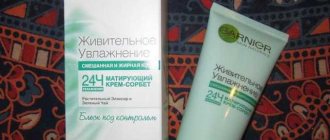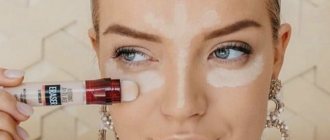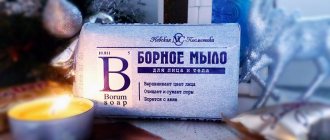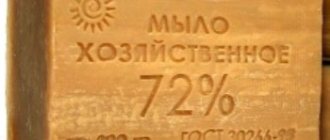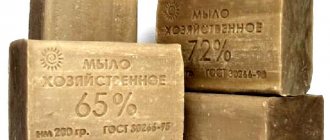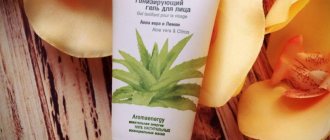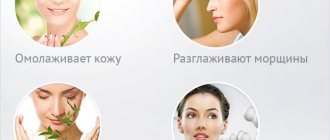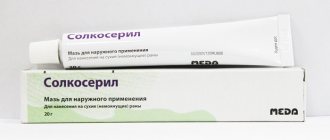The incredible variety of skin care products in stores and beauty salons has led to an interesting consequence - more and more girls are turning to their grandmother’s old recipes for masks and creams, since store-bought ones cause allergies, are expensive and are not very effective. In the wake of a return to old traditions, the question began to be asked again: is it possible to wash your face with soap every day instead of foams and gels, and if so, which one to choose?
- What is soap?
- Is it possible to wash your face with soap?
- Is it possible to wash your face with tar soap?
- Is it possible to wash your face with laundry soap?
- Is it possible to wash your face with baby soap?
- Why can't you use antibacterial soap?
- How can you tell if a skin cleanser contains soap?
- Conclusion
- Video on the topic
What is soap?
Soap is primarily a combination of alkali and acid. In nature, these substances do not mix, so soap is not found in its pure form. As a result of the reaction, glycerol is released and the sodium salt of fatty acids appears. It is this combination that allows water molecules to react with dirt on the hands and body, dissolve them and wash them, picking up pathogenic microbes that died in an alkaline environment along the way.
Without a soap base, it is impossible to wash off the film of fat on the face mixed with sweat, dust and cosmetics.
Natural glycerin contained in the detergent is able to moisturize the skin, since it actively retains moisture inside itself and, when cleansing the face, is able to transfer it to the upper layers of the epidermis.
The main problem is that the epidermis itself has a slightly acidic reaction, and with prolonged exposure to alkali it becomes thinner, begins to dry out and peel off, which creates an ideal breeding ground for bacteria. That is, the more often we wash our face with soap, the more bacteria settle on it.
Therefore, the use of soap for washing directly depends on the type of skin and what type of detergent is chosen.
Disputes about hygiene and soap
Thus, scientists have determined that daily showering (or even several times a day) eliminates beneficial bacteria, dries out the skin and hair, and soap ends up in wastewater and pollutes the environment. However, most of the reasons scientists believe you shouldn't shower every day have more to do with the use of soap, rather than the shower itself. Soap should only be used when absolutely necessary to remove heavy soiling and pathogenic bacteria and viruses. In general, the modern desire for ideal cleanliness through the use of a variety of cosmetics and hygiene products is now actively discussed as one of the factors of immunity disorders and the provocation of infections.
Thus, people lived for centuries in conditions where daily showers and the use of soap were a luxury. Their body was constantly in contact with billions of bacteria, viruses and fungi, stimulating the immune system.
But civilization brought with it the daily use of soap and hot water, and experts say that even after the most active days, you don't need to wash your body in the shower with soap. Dirt does not cause disease, but repeatedly destroying the good bacteria on our skin can actually damage our immunity.
Is it possible to wash your face with soap?
Soap, on the one hand, perfectly cleanses the skin and disinfects it, on the other hand, it dries it out and makes it susceptible to external influences (wind, frost, dry indoor air, bacteria).
Therefore, you can wash your face with it in the following cases:
- if you have oily skin, once a day in the evening to remove makeup and cleanse pores of sebaceous plugs;
- for normal skin - two or three times a week, also at night, after washing, immediately apply a moisturizer or mask.
For those with dry skin, it is generally not advisable to wash your face with products containing alkali - they will cause severe harm to already sensitive skin.
Even after a single use, irritation will appear on the skin, dry areas will begin to peel, eyelids and delicate skin around the lips will become painful. In this case, even a rich cream may not help - it will be necessary to carry out a whole range of procedures (masks, moisturizing, visiting a dermatologist) to minimize the damage caused.
Reference. In any case, the purchased product (solid or liquid) must be marked “for the face.” If it is intended for the body, legs or intimate hygiene, it is strictly not recommended to wash your face with it.
Owners of even very oily skin should abandon the simple cleansing method in the following cases:
- after procedures in a cosmetologist’s office;
- if there is damage to the face - scratches, cracks, cuts;
- with rosacea.
In this case, it is better to use tonics - medicinal, recommended by a dermatologist, or prepared independently.
Is it possible to wash your face with tar soap?
Probably absolutely everyone has heard about the extraordinary benefits of tar soap. It is believed to help get rid of acne, skin irritations, blackheads and even out tone.
Indeed, birch tar (of which there is only about 10% in soap) disinfects the skin and starts the process of its regeneration - that is, scratches, abrasions and traces of pustules can heal faster.
Fragrant black soap contains more glycerin, plus the tar itself helps moisturize the epidermis. Therefore, for medicinal purposes - but only occasionally - it can be used even by those with dry and normal facial skin.
But this useful product has one very big drawback - a sharp, unmistakable smell. It eats into the skin so that even scented face cream does not mask it. Moreover, the “aroma” lasts for many days, especially if the soap gets on your hair.
Therefore, to treat problem areas of the skin, it is still worth using special healing gels. If you have nothing on hand except a piece of black soap, apply it to pimples and wounds point by point, carefully rinsing off immediately after use.
Is it possible to wash your face with laundry soap?
The opinion that laundry soap can cure teenage acne dates back to the times of the USSR, when young people had acne, but there were no means to treat them. That's why they used foam from an available brownish block or alcohol tinctures.
Nowadays there are many products for washing and drying acne, but beautiful ladies still continue to use the “grandmother’s” method from time to time. Is there any benefit from washing like this?
- Laundry soap contains a larger amount of alkali than other soaps - therefore it can dry out acne and pimples on the face;
- perfectly dissolves sebum and cleanses pores.
But at the same time, simple soap without additives or fragrances very much dries out the upper layer of the epidermis. Therefore, you should not use it if there is irritation and redness. If your skin is oily and requires thorough cleansing, you can use this product from time to time, but after washing, immediately apply a deeply moisturizing cream, and at night, a nourishing mask.
Important. After washing with laundry soap, your facial skin looks as if it has been wiped with a cotton swab containing pure alcohol - thin and dry. It’s not worth carrying out such experiments on yourself every day - this can lead to a dermatologist’s office for serious treatment in a couple of months.
Is it possible to wash your face with baby soap?
Oddly enough, baby soap has the least benefit for the skin. It does not have any healing properties, and its only advantage is a strong soft foam that washes off makeup and dirt well.
Baby soap has no fragrances, a fairly large amount of glycerin and is Ph neutral. That is, you can wash your face with it from time to time if your skin is oily or normal, but you shouldn’t overuse it.
Soap for oily skin
A greasy, shiny face is a serious problem for many women; it is not aesthetically pleasing and causes discomfort. In addition, makeup does not adhere very well to oily skin. For her, it is recommended to choose soap with a slight drying effect, without harmful additives. It is not recommended to use it alone on an ongoing basis; this may disrupt the course of natural processes. Special gels and soft foams should be used at the same time. Which products are most suitable:
- Dr. Clear, The Skin House. Breaks down fat, makes skin fresh and matte. Does not damage the natural protective layer.
- Lipacid. Liquid cleanser and daily care. Removes shine, leaving the face perfectly matte. Normalizes cellular respiration. Doesn't dry out.
- Honey Bee's Control Soap. The product contains tea tree, grape seed and lavender oils, and bee venom. These ingredients nourish and moisturize while eliminating oil.
- Sebium, Bioderma. Improves the appearance of the face, refreshes. Eliminates inflammation, rashes, has an antifungal effect.
- Black Mud, Sea of Spa. Product with Dead Sea minerals. Suitable for skin that has already been affected by age-related changes. Has an anti-inflammatory effect.
- Green Tea Egg Soap. Contains green tea. Gives matte finish.
- Blackhead Soap, Circle. Black product to combat acne, enlarged pores, blackheads. Contains olive oil, soy extract, green tea, charcoal. Perfect for people with problematic but sensitive skin.
Why can't you use antibacterial soap?
Antibacterial soap should never be used for washing. The maximum it is suitable for is washing hands. The fact is that liquid and solid antibacterial agents contain triclosan.
- On the one hand , it destroys bacteria, both beneficial and harmful, while destroying the natural microflora of the epidermis and making it vulnerable to external influences.
- On the other hand , it causes mutations in bacteria that allow them to adapt to an unfavorable environment. Mutated microorganisms lead to severe allergic manifestations on the face and body and cause dermatitis.
And, to refute the usual myth, antibacterial soap does not treat acne, since due to dry skin and resulting irritation, acne only increases. Plus, triclosan can disrupt hormonal balance, which also does not contribute to a fresh complexion.
Handmade soap - pros and cons
If you don’t trust store-bought products and prefer to use only homemade products, you can easily create high-quality, and most importantly, safe soap at home.
The choice of soap base plays an important role! It should be a base without fragrance, dyes or aggressive components. To prepare, you can use these two recipes:
- Prepare your soap base. Add oils (orange, grape), white clay (1 tablespoon) to the resulting liquid and pour the resulting substance into molds to cool.
- Add literally 5-10 drops of almond and peach oil, 1 tablespoon of coffee and orange peel to the dissolved baby soap. Afterwards, pour the liquid into molds and place in the refrigerator.
- The advantages of this option include the following:
- you will probably know what is included in the composition;
- the soap will contain the ingredients that you need;
- In terms of price, such a product will be cheaper than a ready-made product.
As for the disadvantages, they also exist:
- the wrong combination of components can cause a negative body reaction to washing;
- a low-quality soap base can dry out the face and all efforts with oils and herbs will be in vain;
- personal intolerance to certain natural components is possible.
Of course, taking into account all the above factors, the created masterpiece will turn out to be an excellent solution for daily facial care. Moreover, having prepared the base, you can divide it into several portions and make several different types of soap at a time, for example, scrubbing, nourishing and drying.
How can you tell if a skin cleanser contains soap?
In some cases, even in expensive foams and gels, manufacturers include soap and its derivatives. You can calculate its presence in a liquid product by carefully looking at the composition.
Any combinations that contain the ending “at” and sodium with potassium (for example, “sodium cocoate”) indicate the presence of a substance obtained as a result of the reaction of fat with alkali - that is, soap. It is not recommended for those with dry skin to buy such cosmetics.
How to remove subcutaneous acne* on the face?
The consequence of improper hygiene can be clogged pores, which is one of the links in the pathogenesis of acne9. If subcutaneous acne appears, you should consult a dermatologist. If he diagnoses acne, he will prescribe a set of topical and systemic medications (depending on the degree of acne) that will help resolve the rash.
One of the drugs used in the treatment of mild to moderate acne is Azelik®9.5 gel. The main active ingredient in its composition is azelaic acid5. Azelik® gel should be applied to the skin twice a day after cleansing5.
*acne
Customer Reviews
What do women who use these products say about facial soap and its benefits? We invite you to explore several points of view:
Marina, 31 years old
I’ve never been a fan of the Clinic brand, but when I needed a cleansing gel I remembered that it was praised. And since the store where I bought it was running a promotion, I decided to take a risk. I’ll say right away that the consistency of this liquid soap is more like a gel. The smell is pleasant, but not too pronounced, so it does not cause irritation. Foams to a rich foam. Removes mascara well. By the way, the bottle comes with a high-quality dispenser. After washing, the skin feels like it is lightly covered with gel - very smooth and soft.
Anastasia, 20 years old
To get rid of inflamed acne, a friend recommended tar soap. I chose liquid form. I’ve been washing my face with it once a week for a month now and the effect is clearly noticeable. There are fewer pimples, the inflammation has gone down. I recommend it to everyone who knows my problem.
Katya, 18 years old
I use liquid soap from Clean Line “For Face and Hands”. Super soft, delicate. Works well with cosmetics and makes the skin moisturized. Used sparingly.
Irina, 36 years old
I recently discovered Dove soap. I like the aroma and the softness of the product. The skin became smooth. I would say that this is a cream with added soap, and not vice versa!
Dasha, 27 years old
Since I discovered Clinique Liquid Facial Soap, I have never regretted it. I have always had flaking in my chin and nose area, but this product, to my surprise, does not make the problem worse at all. Very economical, one small squeeze is enough to completely wash your face. The smell is not pronounced, which is also a plus, since I can’t stand too strong aromas.
Svetlana, 24 years old
I'm already used to Clinic brands. They do not have a strong odor, their price is reasonable, and they are just what you need for combination skin. The soap foams well and literally glides across the surface. After washing my face, I never felt any tightness, although many products caused this effect. Cleanses all areas evenly, as if it evens out the skin type itself. It becomes equally clean, not dry and not greasy.
Masha, 22 years old
As the owner of combination skin, I have experienced flaking during the cold season. For a long time I was looking for a good product that would not dry out my face. I am completely satisfied with the products from Clinic. Upon contact with water, soap turns into a gel. Does not cause allergies. After using it, your face feels soft to the touch.
How to choose soap?
If you're not sure what your soap contains, it's best to discard it. Bar soaps tend to be the harshest because they have a higher, more alkaline pH than normal skin. Body washes and shower gels are formulated differently, with surfactants or emulsifiers, and are closer to our skin's natural pH. All three types of soap dissolve and wash away vital lipids needed by our skin.
Hence, you do not need to use regular soap in your daily hygiene routine. All you absolutely need to stay clean is warm water. It does a great job of removing dirt without stripping the vital oils from your skin. Also, avoid long, hot showers. Just a few minutes under running water is enough to wash away the dirt accumulated during the day, otherwise hot water can also dry out the skin.
You can use a mild cleanser on your armpits and genital area if you sweat a lot. But if you don't sweat a lot or your skin is literally covered with a layer of dirt, don't worry, just warm water is enough for hygiene.
Why is clean and healthy skin so important?
Our skin is our largest organ and plays an important role in maintaining health. Skin protects us from illness and injury and helps regulate body temperature, so maintaining its integrity is vital to overall health.
Although soap is marketed as an exfoliator and cleanser that removes dead skin cells and carries away oil and dirt, it can also be a factor that negatively affects the epidermis.
Over the years, it has been discovered that regular soaps, which are made by mixing fat or oil with lye, can destroy the skin by changing its pH, killing healthy bacteria and removing vital lipids from the surface of the epidermis. Healthy skin's pH is around 5.5, which is slightly acidic, but most regular soaps have a much higher pH, sometimes as high as 11 (severely alkaline). When your skin's pH is too high, your body produces excess sebum to protect itself from aggression and restore its natural pH levels. As a result, the skin becomes too oily. You wash your body again, the soap suds emulsify or bind to the lipid matrix of the skin. It becomes very dry and produces sebum again.
The time it takes for our skin's hydrolipid mantle (the protective layer of oils, fatty acids and amino acids) to damage can vary greatly, but signs of damage include increased dryness, itching, irritation and inflammation. All this can also worsen the condition of the skin, causing acne, eczema, dermatitis and rosacea.
And what will help eliminate these symptoms? Lipids that regular soap removes! These fatty compounds perform an important function in keeping the skin hydrated and intact. Without them, our skin becomes susceptible to damage and irritation that can compromise its function as a protective barrier.
The centuries-old cleansing process can make it difficult for your skin to regenerate and protect itself. But it is possible to restore the optimal state of the epidermis.
Alternative options
One option is to cleanse the skin with products containing fatty components. While it may seem counterintuitive to wash your skin with oils to cleanse it, it is a much healthier alternative than regular soap. Oil-based cleansers trap dirt and dead skin cells, allowing them to be cleansed without destroying the hydrolipid layer. Modern oil-based cleansers produce a light foam when wet that rinses off easily without damaging the skin or leaving behind any residue.
Dry cleansing is another effective way to remove dead cells and dirt from the surface of the skin, while also promoting the production of healthy oils. Dry brushing involves scrubbing dry leather with a natural fiber brush. Moving the bristles across the skin helps exfoliate and remove dirt. There is also some evidence that cleansing your skin promotes lymphatic drainage, thereby serving as a detox not only for your skin, but for your entire body. Once you've cleansed your entire body, shower in cool water and apply your regular moisturizer.
Make your own all-natural scrub. There are literally thousands of different food recipes that you can make right in your own kitchen. These include salt and sugar scrubs, coffee, oatmeal and honey exfoliations. They remove dead skin cells and keep your body well hydrated without damaging your skin's natural barrier. Just remember, harsh scrubs should not be used on your face, as the skin there is more delicate and sugar crystals, the harsh ingredients, can cause micro-damage.
